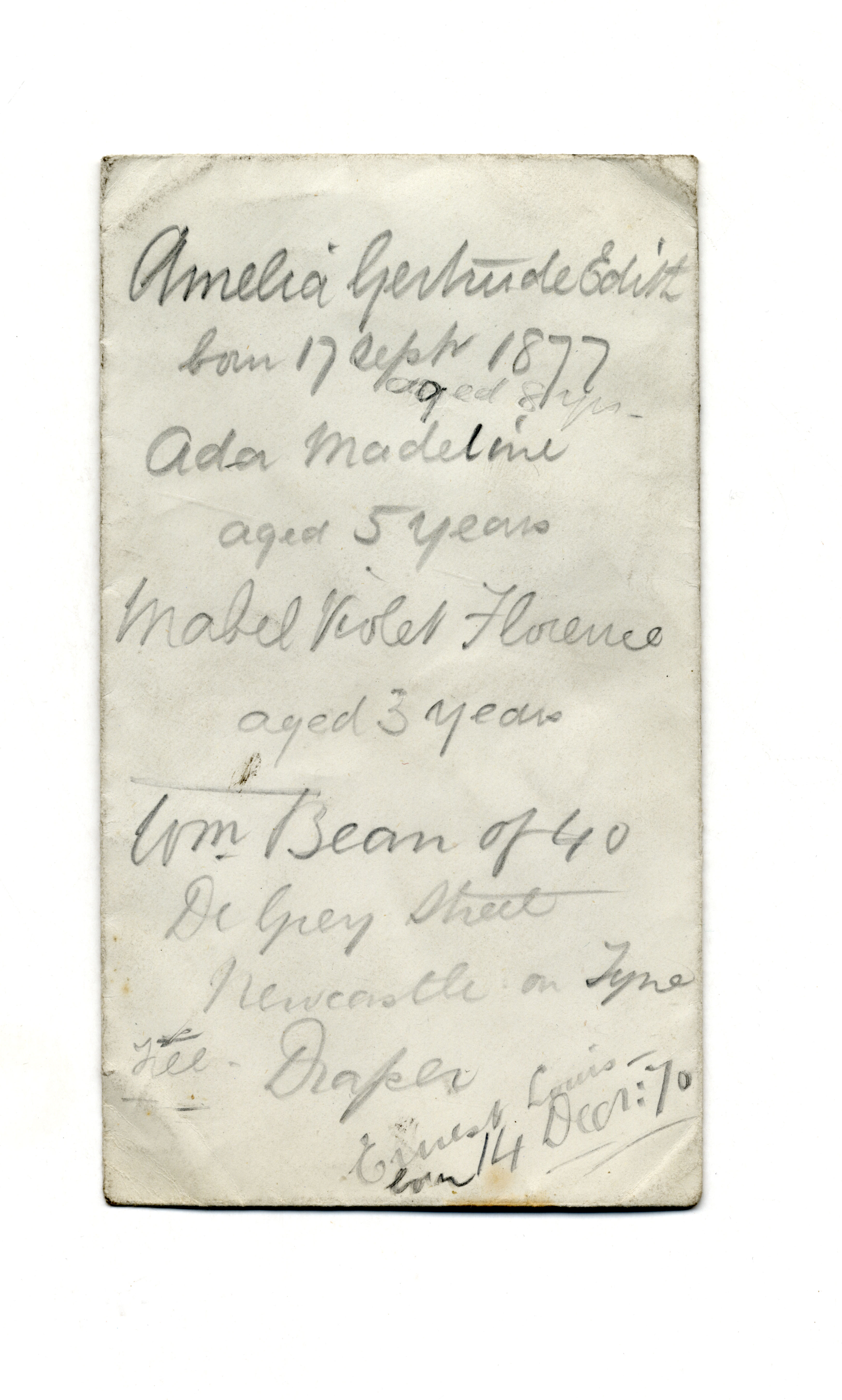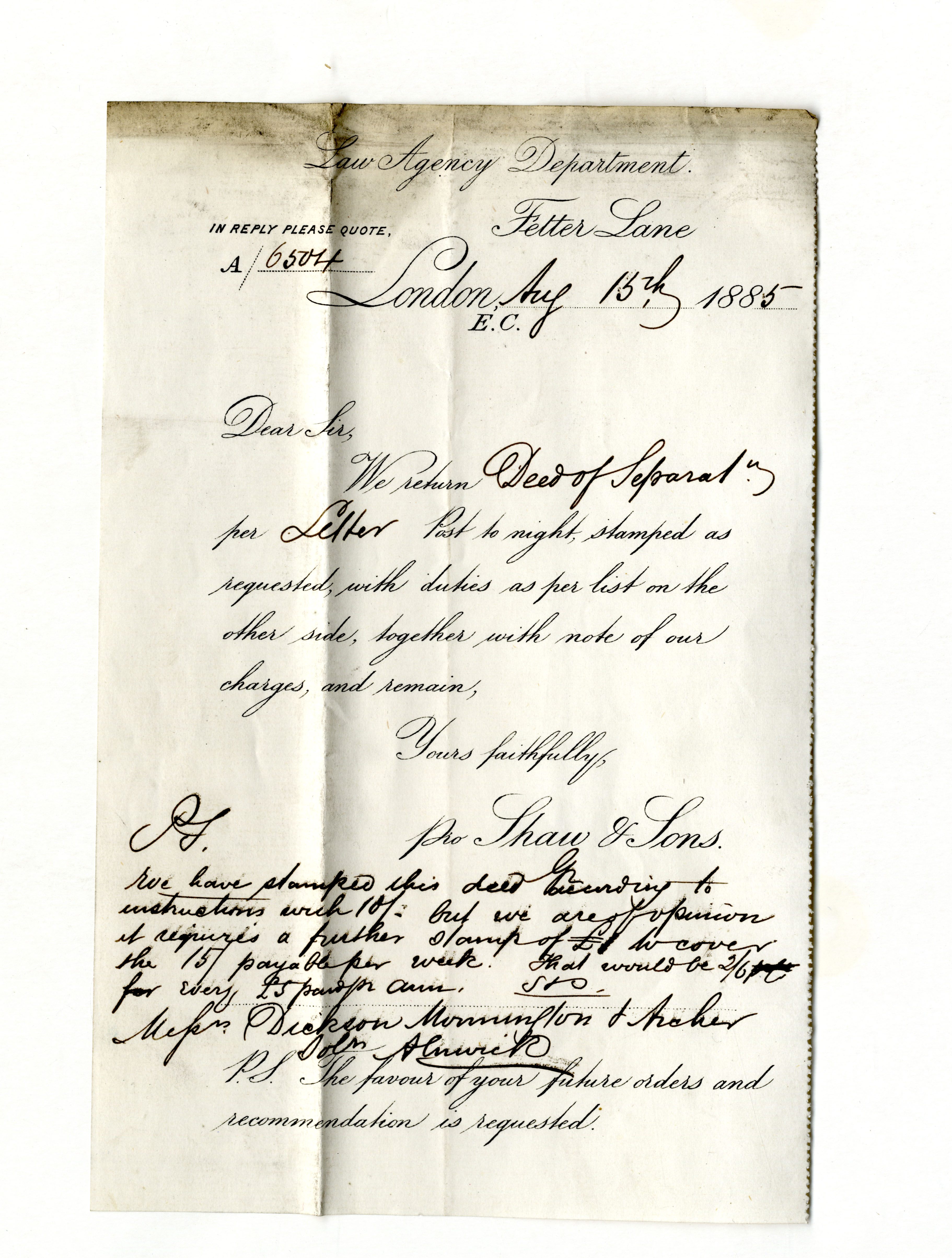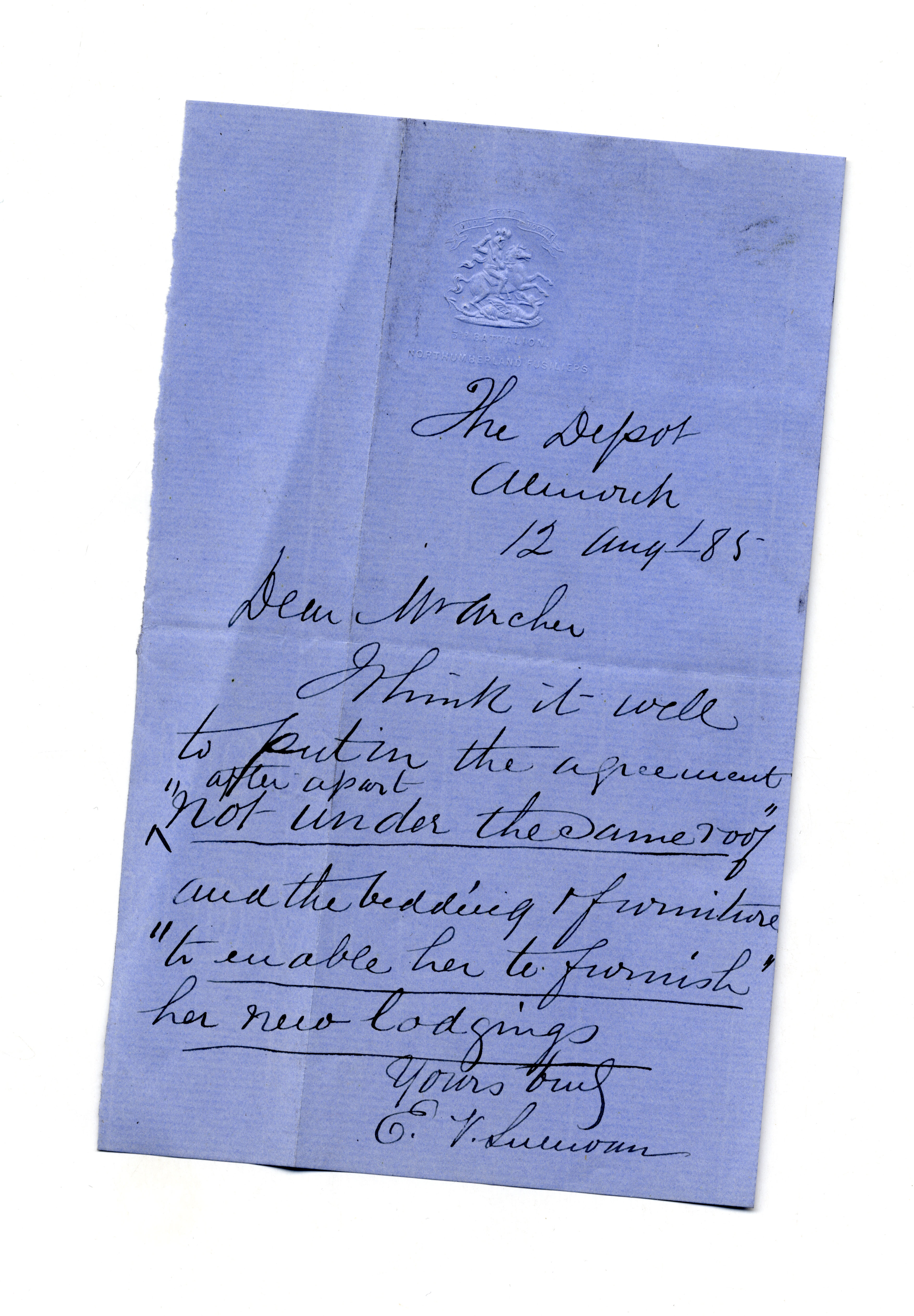During the early 1900s Charles Fenwick Thorp and his nephew, Andrew Fenwick Thorp, penned a series of letters discussing a diverse range of topics, from the First World War to horse racing. The Thorp family were deeply rooted in the affairs of Northumberland, and held large swathes of property across the county. They often sat on various council and governmental boards, and ran a prominent legal firm from their base in Alnwick. The letters penned by Charles and Andrew during this period had been addressed to, and received by, a “dear Tom” (most likely Charles’ younger brother.) These men were the uncles and cousins of Robert and Collingwood Thorp – decorated soldiers whose war-time letters we also hold in our collection. This particular selection of letters, written predominantly from the home front, have been painstakingly transcribed and researched by our volunteers, and the originals can be viewed here.
Some of the letters pre-date the First World War by two years, and go on to trace the build up to one of Europe’s darkest periods. The letters penned by both Andrew and Charles are therefore hugely significant; as one writer pours out the emotions of a young man about to enter the First World War whilst the second relays the fears of an old man left behind. Andrew’s letters begin by giving us an unfiltered insight into the concerns and joys of a young gentleman in the year 1912. In these letters he discusses money, capital and prospects. He plans care-free excursions and debates the standard of horse racing. He considers his future, with a dose of melodrama, giving the pros of becoming a farmer or the cons of hiding abroad. But Andrew’s letters turn painfully serious as the years progress and he becomes acquainted with the fragility of life. In August 1914 Andrew is twenty-four years old, the world is on the brink of war and he has decided to write a will. Perhaps the most upsetting aspect of his correspondence is his sincere belief that “the war won’t last more than a year.” This is a 24 year old man actively preparing for his own death.
Charles letters, in comparison, predominately cover the period during war. Within them he informs his brother of the whereabouts of his two sons, referred to as John and Arthur, as well as the military activities of their common nephew Andrew. These letters provide small snippets of family news mixed with wry observations about turnips, the war effort and the physical weight of military uniform. Charles even gives a play-by-play account of the location and route of “Zeps” or zeppelins across the English countryside. How Charles feels about the impending doom of war is difficult to decipher. He is initially proud of his younger relatives for having entered the service of their country, and is eager for them to see action, but he also frets about the dangerous position of Andrew on the continent. He finds the process of war frustrating, labelling it “vexing,” and he tries to continue with his day-to-day life as much as possible. Charles is a complex character; full of paternal instinct, strong views and a haunting foreboding that the war will leave an irreversible mark on his family. These letters give us a fascinating insight into how ordinary Northumbrians were affected by war and loss.
Charles Fenwick Thorp
Charles Fenwick Thorp was born in 1857 at Ellingham, Northumberland. He was the eldest son, and first child, of Reverend Charles Thorp the elder and his wife Isabella Frances Fenwick. The Thorp-Fenwick’s had numerous children, all of whom were born in Ellingham. They were Mary Isabel, George, Robert Edward, John, Thomas, William and Frances. In the 1871 census this huge household had eight servants; including a governess, two nurses, a groom and a gardener.
Charles Fenwick Thorp, and his brother Robert, studied at the Mount School in Northallerton under the Edwin Brittlestone MA Clergyman. Charles pursued his education and, like his father before him, became a reverend taking up residency in Beadnell in 1887.
He married his wife, Jane Booth, in her home town of Warlaby, Northallerton on the 13th September 1894. A few years later, in 1897, Charles was appointed Chaplain of the Northumberland Fusiliers, 1st Battalion situated at Alnwick. In 1901 Charles and Jane were residing at Beadnell Vicarage with their young son Charles Arthur Robert Thorp, whom had been baptised at Beadnell on the 18th July 1899. The couple subsequently went on to have two more children; Frances Victoria Thorp (born 1901) and John C Thorp (born 1904).
Charles moved his family into The Rectory in Ovingham at some point before 1911. This property had ample space to live and entertain, with ten rooms. Charles and Jane remained in Ovingham for almost fifteen years, and most of Charles’ war time letters were written from this residency. Charles died in 1935, at Aldbrough St John in Yorkshire, leaving behind effects equalling £226 2s 1d. The executors of his will were his widow Jane and Thomas Alder Thorp – presumably “dear Tom.”
The Rectory
Ovingham-on-Tyne
Northumberland
April 3rd 1916
Dear Tom
I have sent Mother’s cheque by this post to Office, and asked them to pay in balance £10 to my acct on 14th. Very many thanks; I fear I shall be asking you for some help for last half of this month and then shall be clear, but will write you.
Andrew and a party of 40 had another walk out 8 miles and were all stiff after it.
These beastly Zeps been about 3 nights, last night only 6 miles away from here at Stamfordham and Ponteland then Northwards, did you have them.
Yours ever
Signed: Chas. F. Thorp



The Rectory
Ovingham-on-Tyne
May 1st 1917
My dear Tom,
Can you help me to get these papers put in order again. Off Bigge’s payment comes 5 shilling Inc tax he deducts it before he sends it. Papers came this morning. Both boys left this morning for Bradfield we had to be up at 5. On acct of trains. It was vexing! Arthur had to go up to London last week and back again, to have his interview and medical exam at Admiralty, they began last week and were taking those who would go either into Navy or Marines first.
A nice little expense!! But he traveled up by night and spent one night at Pinner.
Yours ever
Signed: Chas. F. Thorp
I sent Mothers cheque to Office today to redeem mine.


Letters REF: NRO 11343/B/DAT
The Rectory
Ovingham-on-Tyne
July 15th 1917
My dear Tom
Do you think Office can advance me £20 into Bank till Aug 1st to keep me right there and carry me on. On Tuesday will do I expect I shall be 4 or 5 overdrawn there by then. I enclose cheque for £25.
Jenny saw some of raid in London she was at Lord Roberts workshops, seeing over … at the time; lot of damage done. Arthur and his companions at … in Burlington House were sent into basement and not told reason, much disgusted saw nothing. Arthur went up top of St Paul’s one evening and saw the damage to GPO and other paces.
We are getting parched up here hardly any turnips.
Yours sincerely
Signed: Chas. F Thorp
Andrew and 400 been removed from Criffeld into Hanover!!!


Letters, REF: NRO 11343/B/DAT
The Rectory
Ovingham-on-Tyne
Sept 6 1917
My dear Tom
Can the Office help me with £20 this month. Arthur has gone off to the R N College Keyham, Devenport as a Cadet, will be there till Feb. before going to sea proper as Mids. They are crammed there and on board the “Vivid” in the time and if satisfactory are passed on as Midshipmen. He passed his exam quite well. 7th for Navy of the 50 accepted, 90 were in. 1st out of 20 for R Marines and 8 for Indian Army “Quetta.” His outfit is heavy in clothing line etc. And has to have sextant and telescope as soon as he begins work at College. Mother is helping with outfit but Mary says they are very short till Nov. So I may have to ask for help in Oct. too in advance. And the times are awful. If the £20 can be paid in by Sat will do. I still have to allow it, rate of £50 a year while at Keyham; ? ? …. pay it.
What a mess these Russians are making of it.
Yours sincerely
Signed: Chas. F. Thorp
Andrew Fenwick Thorp
Andrew Fenwick Thorp was the only child of Robert Edward Thorp (the younger brother of Charles Fenwick Thorp.) His father, Robert, had been born to the Reverend Charles Thorp and Frances Fenwick in 1861. He had married Andrew’s mother Alice Maud Hanning, a Gateshead native, in the October of 1889 at Newcastle Upon Tyne. In the following year the couple welcomed their only child, Andrew. Sadly Andrew was orphaned young in the most tragic of circumstances, with his mother dying soon after his birth and his father being lost “at sea” in 1899. Following the death of his parents Andrew was placed in the care of his grandmother, Isabella Frances Fenwick Thorp, and brought up in the family’s spacious seat of Dene Head House in Ryton. In the 1911 census this house was listed as having 17 rooms, including a kitchen, and a large body of staff.
In Andrew’s letters he frequently refers to a ‘G.’ This appears to have been an affectionate nickname for a woman to whom he is very attached, but not yet betrothed. In a draft of Andrew’s will, dated the 15th February 1912, her full identity is revealed to be Gwendoline Katherine Leonore Maclean. In this particular draft he leaves all his worldly effects to ‘G’ and, if she should pre-decease him, his cousin Charles Arthur Robert Thorp. A Gwendoline Maclean can be found residing in Northumberland in the 1911 census. This Gwendoline had been widowed in 1909 and had returned to the family seat of Shorestone Hall, along with her young son, to live with her father, brothers, sister-in-law and six female servants. One of her brothers was a theatrical actor. Gwendoline’s son had been born in Bangalore India; this was perhaps explained by her first husband coming from a family of British military personnel. This Gwendoline was most likely the ‘G’ in Andrew’s letters, as her brother is named as an executor in drafts of Andrew’s will and often referred to by Andrew as a “close friend.”
However the relationship between Andrew and “G” did not last the war. Instead, at some point between October and December of 1919, Andrew married Mary Primrose Deane in Dublin. Their only child, Juliette Maeve Isobel Primrose Thorp, was born in Newcastle Upon Tyne in 1925.
Dene Head House
Ryton on Tyne
Sunday March 31st 1912
Dear Tom
I am sorry I have taken such a long time in writing to you but I haven’t had any real time to do things during the week. I have been carefully over the draft you sent me several times and I am quite sure now that it expresses my wishes exactly and I can think of no alteration or improvement to be made in it. I never saw you at the Point to Point but I saw your sister and Colin. Were you there? The racing was a bit poor I thought. But there was plenty of rank and beauty about. Roger Marshall and I had a great time.
I am coming down to Monkhouse at Easter.
Yours affect
Signed: Andrew Thorp
Northern Conservative Unionist Club
Newcastle upon Tyne
May 29th 1912
Dear Tom
Can you give me any idea of exact amount of capital I am ever likely to have. After five months in the works, I am afraid I don’t think I can go on with it much longer. Certainly not for 5 years. At the end of that time I should either have to sit for several exams which my maths would plough me in I am afraid, or else I should have to go to sea and take my tickets which is not much of a life especially down in the engine room. Can farming be possibly made to pay in England. I don’t want to go abroad. It seems to me that quite a fair average of farmers, who had nothing very much to start on, have managed to make a living out of it. Do you know what sort of price I ought to pay for mud-pupilling. I have not told my people of this at present, I am afraid it will be a great disappointment for them my not getting on with the works as I think they had visions of my becoming a manager in 5 years.
Yours sincerely
Signed: Andrew Thorp
Patten Arms Hotel Warrington
Dated Aug 6th (War-Time – assumed 1914)
Dear Tom
I am quartered here till Saturday night when I(crossed through), we leave for Blundelsands. I shall send my address there to you as soon as I can. I am in the 3rd bat. of the South Lancs regiment. I feel I ought to make a new Will. It is not fair to my people to leave everything to G before I am even engaged really to her. One never knows what may happen in times like these. So will you draw one up leaving everything I’ve got to Mary in the 1st instance and if she is dead to Arthur, yourself and Frank Long had better be executors as the War won’t last more than a year or so and I can make a new one if I come through. The executors had better have £100 each. I will tell you where to send this for my signature as soon as I know. At present it will only be police work and guarding the Mersey but we expect to have all to go to Belgium. We have sent off two drafts already to the other two batts.
Yours affect
Signed: Andrew Thorp, 2nd Lieut, 3rd batt, South Lancs
We would like to extend a special thanks to the volunteers who have transcribed and listed these wonderful letters, and for their brilliant research which has brought these individuals to life.






